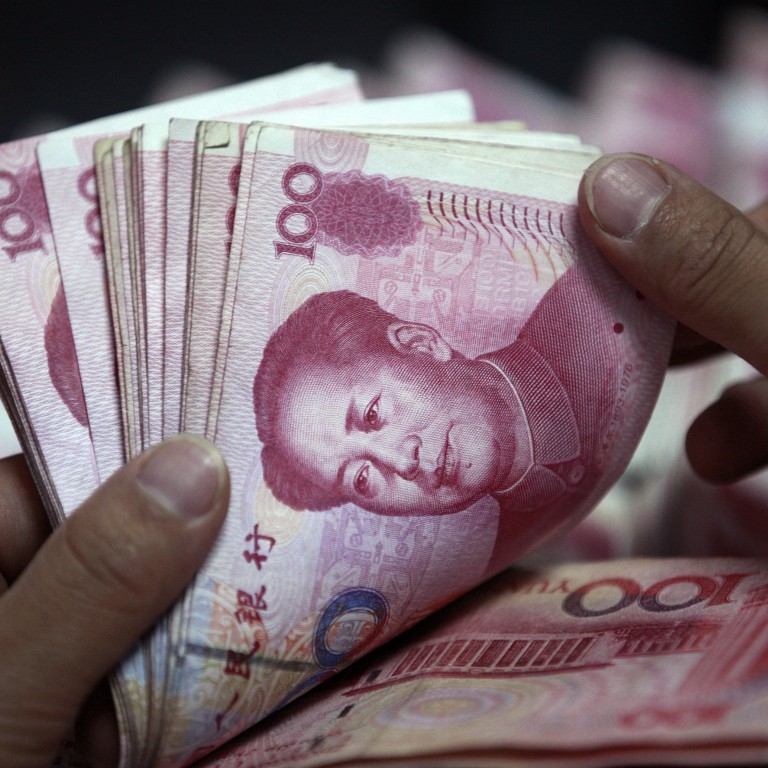
Yuan anti-speculation drive brings ill wind from the north
Currency's weakening trend poses threat to mainland companies expecting windfalls from their huge bets on it appreciating
As the yuan enters its sixth week of decline, financial officers at many mainland corporations are sweating. So should their shareholders.
Among them would be China Chengtong Development, one of the more than 100 state vehicles listed in Hong Kong and controlled by the central government.
Last year, the trading company doubled its borrowings to HK$9.4 billion, of which HK$3.2 billion was invested in yuan-denominated products and entrusted loans with mainland banks. That was 30 times the amount in 2012.
In short, Chengtong had betted heavily on yuan appreciation.
Why not? That was what many could have been doing back then.
Companies … face a threefold threat if the yuan stays at its current level or weakens further
For years, the yuan's appreciation seemed as certain as the sun rising in the east. Having to pay for a US dollar loan with a yuan asset did not bother many. The windfall came dirt cheap.
According to a circular issued by Chengtong in December last year, its borrowing cost was only between 0.9 and 3.8 per cent while the anticipated net return of investment products ranged from 3.48 per cent to 5.2 per cent.
"The directors considered the above arrangement would be a better utilisation of funds and could create a higher return to the group," the circular said.
This greed had been well-fed by the banks. All sorts of too-good-to-be-true products betting on the yuan had been on offer not just to corporates, but also individuals.
In the case of Chengtong, Singapore's Oversea-Chinese Banking Corp subscribed for its 1 billion yuan (HK$1.25 billion) worth of multi-currency notes. The condition was the company had to buy an equal amount of yuan-based investment products from the bank on the mainland.
The bank got loan growth and fee income. Chengtong got a gain of about 1 per cent for "nothing". Chengtong put 360 million yuan into OCBC's products.
"When I brought up a similar proposal at a banquet, everyone gave me the what's-so-new look," said an auditor.
A commercial banker said: "Chengtong is not alone. Many have been offered tens of millions to bet on the yuan to enjoy the windfall."
Chengtong last year received HK$270 million in interest from the investment products, HK$85 million in interest from entrusted loans, and HK$45 million in exchange rate gains from the yuan's appreciation.
Not everyone invested in yuan products did so because of greed. Some did not have a choice. Banks offer loans and treasury products as a package nowadays.
"With the Basel III requirement, trade finance alone is very expensive," one banker said. "If the borrower agrees to put part of the money into a treasury product, the interest rate will be better."
The yuan bet to hedge against "ever-lasting" appreciation comes naturally because many companies need it in their mainland operations.
Now, the yuan's appreciation trend has reversed.
Thanks to the central bank's effort in shaking out speculation, the yuan has fallen about 2.8 per cent against the US dollar since late February.
Now what? Chengtong and many other companies that have bets on the currency face three threats if the yuan stays at its current level or weakens further.
One, the depreciation has largely wiped out the interest rate spread between the borrowings and the investment product.
That is assuming a weak yuan has not affected the liquidity of those which borrowed through investment products and can repay. That is not a safe assumption, given the widespread yuan speculation by mainland companies.
Two, the massive yuan investment products or assets will result in exchange losses.
The third concerns a company's liquidity. The buzz is about which companies are having problems topping up their collateral as the value of the yuan investment products heads down. Besides that, the foreign currency loans are increasingly expensive to service as the yuan falls.
The Chengtong case is only about a very basic bet. The impact of more complicated derivatives and higher leverage could be devastating.
This brings to mind Citic Pacific's HK$12.1 billion loss from its bet on the Australian dollar that went wrong and the 13.1 billion yuan loss of the mainland's three major airlines from some oil-related derivatives.
The risk controls of mainland corporations have offered little comfort so far.
None of the tension and risk has surfaced in the recent results announcements, thanks to the two to three-month lag between the end of the financial year and the announcements.
That has allowed financial officers time to negotiate with banks on a way out and to pray for a rebound in the yuan.
"The yuan is on the rise in the long run. As long as you are strong enough to hang in there, it should be all right," said one financial controller.
That is, if only you are strong enough.

